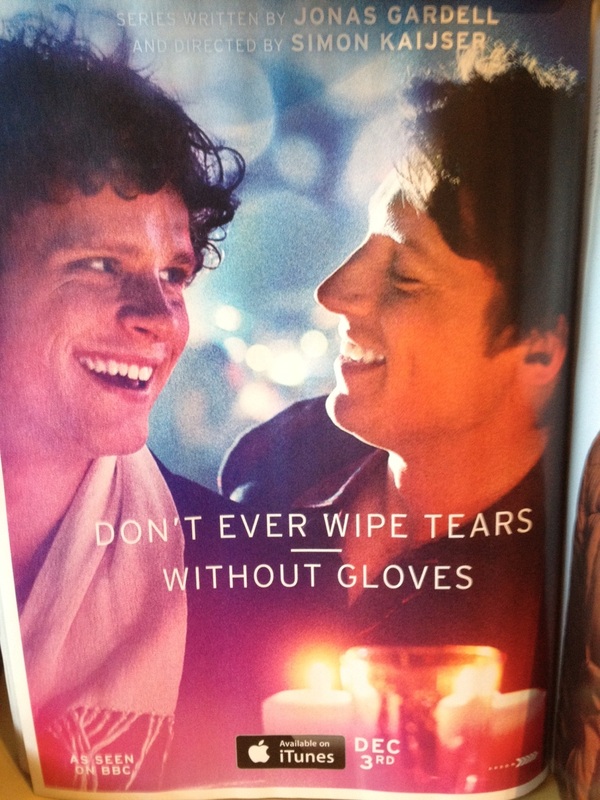DEWTWG is, according to Wikipedia, ‘an award-winning 2012 three-part Swedish TV drama about the impact of Aids in the homosexual community in the early 1980s. It is based on the Swedish novelist Jonas Gardell’s trilogy with the same name, with each episode covering one of the three novels that are subtitled The Love, The Disease and The Death.’
The first episode aired on BBC 4 on 2 December to mark World Aids Day.
To quote one of the characters: ‘It was like a war fought in peace time. In a city where most people went on as if nothing had happened, young men fell ill. They grew emaciated withered away and died. And they were those who loved the most. Those who were obsessed with love. They were the ones who fell to the frost.’
Why has it taken me so long to blog about this?
That’s a good question. Even now, typing that quote makes me well up. I have kept the recording of it and will burn it to DVD to add to my collection. It seemed disrespectful to just delete it after watching it. I cried. A lot. While watching this.
Just from the titles of the three episodes you can tell it’s not going to be a swishy musical of a series. But I think it’s important that we make drama about this time, about these issues, so the young gay men who didn’t live through it, realise what happened, they realise that almost an entire generation of gay men were wiped out, gone.
SPOILER ALERT – sorry, it’s really hard to write a review without mentioning some of the story. I haven’t revealed which character each event relates to, so it’s not too bad as spoilers go.
It’s also important to remember how far we’ve come with gay people’s rights. In one scene a young man is prevented from attending his boyfriend’s funeral by the dead partner’s parents. In another, the parents of a character disown him when he comes out to them. His lifestyle isn’t compatible with their religious beliefs, so they come to his flat with flowers and have a living funeral for him.
Like I said, it’s powerful stuff.
But it’s not all doom and gloom. It shows brilliantly how gay people have always created their own family, wherever they are, and no matter how hostile their surroundings are to their ‘lifestyle’. I use quotation marks because I don’t believe being gay is any more a 'lifestyle' choice than having brown hair or blue eyes, or being left handed is a ‘lifestyle’ choice. But the sort of people who force gay people to hide, tend to believe it is a such a choice. The Winter Olympics. I won’t say any more.
There are some wonderful scenes with the group of gay men spending Christmas and other celebrations together over the years. It is also beautiful to watch how the guys who don’t get sick support those who are ill. There is no blame. I also think it’s important that younger gay men see this drama to remind themselves to do their best to prevent the spread of HIV and Aids, and to support those who are living with HIV, without blame.
The story focuses on Rasmus as he moves from a rural part of Sweden to Stockholm to study at university. Through a mutual friend, Paul – who by the way deserves his own series, I could have watched Paul for hours – Rasmus meets Benjamin. And their love story begins.
Paul is fabulously flamboyant and theatrical, making light of the very serious, and taking the very trivial very seriously – I once read that’s the definition of camp. Paul is the host, the lynchpin of the group, throwing lavish parties for his created family. When asked if he would relive his life, what he would do differently, he takes a slow drag on his cigarette and replies, ‘You can’t relive your life. That’s the point.’
The obituary one of the men writes for himself is simply: ‘His name, I have lived.’
If you saw this series, what did you think of it? If you didn’t see it, I suggest you get your hands on a copy. Although it’s hard going in places, it doesn’t leave you feeling empty and unsatisfied, like so much TV nowadays, it leaves you thinking about your life and making the most of it. And that’s quite a rare thing for TV I’d say.
I’ve written about issues similar to these in my novel, And Then That Happened, which includes parts set around this time.
Until next time,
Liam Livings xx

 RSS Feed
RSS Feed
